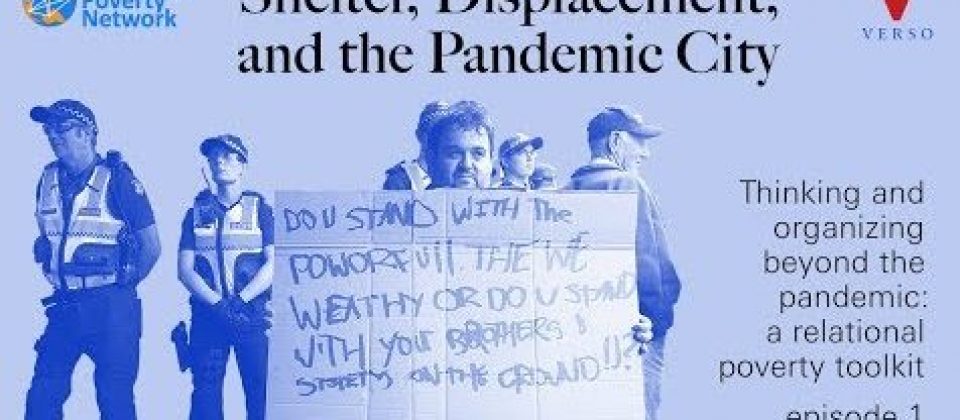Description
A virtual teach-in with speakers from Australia, Argentina, and the United States exploring the ways in which the pandemic is exacerbating the global housing crisis and the vast inequalities in our cities.
This is the first instalment in a four-part teach-in series, co-sponsored by Verso Books and the Relational Poverty Network, entitled Thinking and organising beyond the pandemic, a relational poverty toolkit.
The pandemic intensifies the polarizations and displacements that have shaped cities across the globe in recent decades. Entire neighborhoods are largely spared the disease while it is epidemic to others. Those already most exposed to structural violence are also most at risk for COVID-19, while “shelter-in-place” orders exacerbate the vectors of social exclusion that constrain access to shelter, property, and “home”. The virus predictably sweeps through homeless shelters, for example, while unhoused people continue to be “swept,” criminalized, or dispossessed, and housing-insecure tenants continue to be threatened with eviction. Yet the crisis also reveals what has always been possible—as governments fund hotel rooms and outdoor sanitary facilities, and collectives of unhoused residents organize to take shelter in abandoned buildings. Panelists from Australia, Argentina, and the United States will ask: what form of urban control and displacement are the backdrop for the current crisis? What does “shelter” mean under a “shelter-in-place” order? And how has the pandemic remade urban territory and its political possibilities?
Speakers:
Sara Rankin is a professor of law at Seattle University, and founder of the Homeless Rights Advocacy Project, an organization of researchers who produce empirical research about the effects of urban policies that criminalize homelessness.
Chris Herring is a sociologist at the University of California Berkeley whose work explores poverty and homelessness. He has collaborated with the National Coalition on Homelessness and the Human Rights Workgroup of the San Francisco Coalition on Homelessness, the Anti-Eviction Mapping Project, the Western Regional Advocacy Project, and ACORN.
Tina Grandinetti is a biracial Uchinaanchu woman, born and raised in occupied Hawai’i. She is a journalist, organizer for the Honolulu Tenants Union, and geographer affiliated with the Unequal Cities Network and the Royal Melbourne Institute of Technology. Her research explores settler colonialism, neoliberalism, urban inequality, and the production of housing insecurity and settler colonial geographies in Hawai’i.
Mónica Farías is a geographer at the National Scientific and Technical Research Council and the University of Buenos Aires, who writes about urban politics and urban inequalities. She has organized for many years with la Asamblea Plaza Dorrego-San Telmo, a grassroots collective that emerged in the wake of the 2001 financial crisis, that engages in community advocacy and mutual aid regarding issues such as homelessness and food insecurity.
Jorgelina Di Iorio is psychologist, also based in Buenos Aires, at CONICET and la Universidad de Buenos Aires. Her work advances understanding of the intersection of urban poverty and health/mental health. She also coordinates harm reduction programs, from peer to peer work. She is a feminist and human right activist at Asamblea Popular Plaza Dorrego-San Telmo.
Libby Porter is a geographer at the Royal Melbourne Institute of Technology’s Centre for Urban Research. Her work explores housing systems, urban environments, critical property studies, urban governance, decolonization and settler cities, and children’s sense of space and place. She is also an advocate with the Save Public Housing Collective, and author of books such as Unlearning the Colonial Cultures of Planning and Whose Urban Renaissance?
Spike Chiappalone is a co-founder of the Homeless Persons Union of Victoria, a grassroots community organization that brings together members with lived experience of homelessness and who are passionate about the rights of the homeless, to ensure their human rights are taken seriously by government, service providers, and society. Spike also has lived experience of homelessness and has worked in the homeless service sector.
The Relational Poverty Network convenes an international community of scholars, teachers, policy makers, and activists working within and beyond academia to develop conceptual frameworks, research methodologies, and pedagogies that shift from thinking about “the poor and poor others” to relationships of power and privilege. They work across boundaries to foster a transnational, comparative and interdisciplinary approach to poverty research that involves multidirectional theory building and incorporates marginalized voices to build innovative concepts for poverty research.


Leave a Reply